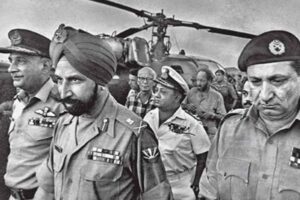The Untold Story of Indian Troops’ Withdrawal and Unprecedented Looting in Bangladesh (1972)
On March 12, 1972, a grand farewell parade was held at Dhaka Stadium to bid farewell to the Indian Armed Forces, who had come to assist Bangladesh during its Liberation War. By March 15, their withdrawal was completed. In his farewell message, Bangabandhu Sheikh Mujibur Rahman expressed heartfelt gratitude:

“In our darkest hours, your extensive aid will forever be remembered with deep appreciation. Although the Bengali people wished to extend their hospitality, the destruction wrought by the Pakistani Army left nothing behind. Yet, their love for you remains genuine. I humbly request you to carry the love of the Bangladeshi people with you.”
But the story does not end there. The aftermath of their departure revealed a different, shameful reality.
As Indian troops withdrew, they committed unprecedented acts of looting across Bangladesh — a spectacle that stunned even foreign observers. The British newspaper The Guardian reported that Indian soldiers looted machinery from factories, including parts of mills, and seized weapons and supplies from Pakistani forces. The total amount of stolen wealth was estimated at a staggering 2.2 billion USD, which included food grains, textiles, vehicles, ships, machinery, guns, and ammunition.
According to reports, Indian forces snatched weapons, heavy artillery, and military supplies from at least four divisions of Pakistan’s armed forces, transporting them into India. When Bangladeshi resistance protested, only a few old weapons were ostensibly returned as token gestures. Furthermore, senior officers such as Brigadier Mishra are documented to have covertly smuggled refrigerators, furniture, and jewelry back to India by trucks. An officer, identified as Brigadier Mishra, was court-martialed for his role in the looting.
Notably, renowned novelist Sunil Gangopadhyay vividly described the scene in his novel Purva Paschim, noting how Indian soldiers filled trucks with refrigerators, televisions, carpets, canned foods, and other foreign goods — items they had never encountered before.
The extent of looting was widespread. Thousands of military and civilian vehicles, weapons, and valuable assets—including private cars—were sent across the border. Even bathroom mirrors and fittings were not spared. Major Jaleel, a sector commander from Khulna, attempted to preserve some items by requisitioning a private car and entrusting it to liberated fighters’ care, in a rare act of resistance.
Resistance Against the Looting
A brave sector commander, Major Jaleel, mobilized local people to actively oppose the looting. His efforts paid off, and by December 31, 1972, he was captured by Indian forces. Detained in an isolated house at Jashore cantonment — previously used by Pakistani forces for torture — Major Jaleel endured harrowing conditions, including bloodstains on the walls, disheveled hair, and carcasses of vultures and jackals. His cell was shrouded in darkness on a cold December night.
Jaleel was the youngest Major during the Liberation War, a fearless soldier in the armored forces. Along with him, other prisoners such as Sultanuiddin Ahmed and Khurshid were also taken for interrogation. While the latter two were released, Major Jaleel was subjected to a military court-martial—presided over by none other than Colonel Taher, a fellow sector commander. Although initially convicted, Jaleel was ultimately proven innocent. However, facing injustice and recognizing the betrayal, he resigned from the Bangladesh Army.
A Legacy of Resistance
Major Jaleel’s story symbolizes the resilience and integrity of many freedom fighters who faced adversity even after the victory. His act of defiance and sacrifice remains an inspiring chapter of Bangladesh’s struggle for independence.
Conclusion
The withdrawal of Indian forces from Bangladesh was hailed as a milestone, yet beneath the surface lay a complex narrative of exploitation and resistance. The widespread looting, illegal smuggling, and the acts of courageous fighters highlight the multifaceted history of Bangladesh’s independence—a history marked not only by liberation but also by the sacrifices and struggles that followed.
RAZNITI.com remains committed to uncovering and sharing these important stories that shape our national history.